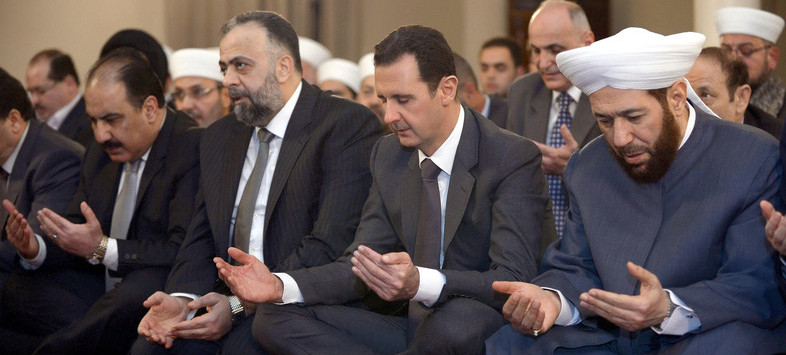PHOTO: President Assad at a prayer service in Damascus, January 2015
What do Syrians think of the sectarian nature of conflict in their country?
The Day After Association, a Syrian-led organization for civil society and democratic transition, pursued this question in a field survey of 2498 respondents — 1424 men and 1074 women — with findings published on Monday.
While recognizing the extent of sectarianism in the five-year conflict, more than 65% of respondents called for an approach through a State based on citizenship and equality. They identified the institutions primarily responsible for sectarian discrimination as the Syrian military (60%), the intelligence services (55.3%), and Government departments (52.8%). The least blame was attached to the Free Syrian Army (14%).
Almost 68% of respondents said one or more sects have benefited from political authority. Nearly all referred to the Alawites and Shiites as the benificiaries. More than 70% of respondents said they had been subjected to sectarian discrimination, either personally or through a family member.
Only 13.6% of all respondents disagreed with the statement: “Sectarian discrimination was a main impediment to the achievement of my most important aspirations”. Almost 94% of Sunnis endorsed the assertion.
There was a significant division among different religious groups over support of the 2011 uprising and the opposition. Almost all Sunni respondents backed the demonstrations, while Alawites and Shia Muslims were opposed. More than half of the Christians in the survey expressed support, but the majority of Druze and Ismaili disapproved.
Despite these differences, all groups supported proposed solutions such as dissolving all armed groups and rebuilding the army in Syria on national bases; restructuring government institutions on the basis of equal opportunity; including materials for citizenship and equality-based education in school curricula; prohibiting entities that resort to sectarian incitement; promoting a national dialogue among the various sects in Syria; and training preachers in mosques for a discourse of toleration.
Only the proposal of “dissolving intelligence services” was opposed by Alawite and Shia respondents.

